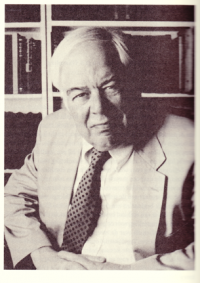Richard Rorty
From Geography
Richard Rorty was born in 1931 in New York City and passed away at age 75 on June 8, 2007 in California. He was an analytical philosopher, who graduated from the Chicago of Rudolf Carnap in 1949, and taught at Princeton, as well as the University of Virginia and Stanford. Rorty left the University of Virginia in 1998, accepting an appointment in the Department of Comparative Literature at Stanford University. He received several academic awards and honours, including a Guggenheim Fellowship (1973-74) and a MacArthur Fellowship (1981-1986).
His inventive work on philosophy, politics, literary theory and more made him one of the world’s most influential contemporary thinkers. One of his most well known books, “Philosophy and the Mirror of Nature”, published in 1979 presents his point of view concerning the purpose and goals of philosophy; he believed human beings should focus on what they do to cope with daily life and not on what they discover by theorizing. Rorty considered himself as a commentator on philosophy instead of someone who creates philosophical theories.
In his book, he accused his colleagues of staying under the Platonic dream of finding the true language in which nature was written and also have the arrogance to impose on others their preferred language in the form of official philosophy of universal truth. Rorty ended advocating for the dissolution of academic philosophy in the various forms of human conversation, art, literature and more.
He rejected the search for truth accusing that it is not more but a scientific dogmatic dream and simultaneously appeal to John Dewey and pragmatism Classic in support of that position is a total misrepresentation of the pragmatist tradition. In consequence, Rorty’s pragmatism is often described as “vulgar pragmatism”. What is really important is that Richard Rorty defended that post philosophical literary pragmatism aims only to “continue conversation”, states that “truth” comes to mean "what you can defend against anyone who is present", and “rationality” is nothing more than "respect for the opinions of those around”.
Richard Rorty is one of the most controversial of philosophers of recent years. His ideas are criticized by multiple fellow philosophers. Rorty is a liberal and therefore was criticized by left thinkers due to the fact that his theories lack in social justice. Also his disbelieve that science can depict the world, received many criticism.
References
- Ramberg, B. (2007). Richard Rorty. Stanford Education. [Found at http://plato.stanford.edu/entries/rorty/ on October 24th 2012]
- Blackburn, S. (2003, April 20). Richard Rorty. Prospect - Issue 85
- Stanford Encyclopedia of Philosophy
- Cohen, P. (2007, June 11). Richard Rorty, Philosopher, Dies at 75. The New York Times
- Vargas-Mendoza, J. E. (2007) Richard Rorty: apuntes para un seminario. México: Asociación Oaxaqueña de Psicología A.C.
Contributors
- Page edited by Doris Roelvink, October 24th 2012.
- Picture and links added by Isis Boot - --IsisBoot 21:08, 24 October 2012 (CEST)
